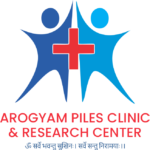Hemorrhoids, commonly known as piles, are swollen veins in the lower rectum and anus. They can be internal, forming inside the rectum, or external, forming under the skin around the anus. When an internal hemorrhoid exits or “prolapses” through the anus, it can cause significant discomfort and requires proper attention.
What is a Prolapsed Hemorrhoid?
A prolapsed hemorrhoid occurs when an internal hemorrhoid pushes through the anal opening, often as a result of straining during bowel movements. This prolapse can lead to a range of symptoms, including pain, irritation, and the sensation of a lump near the anus. Prolapsed hemorrhoids can often be pushed back inside the anus, but in some cases, they may require medical intervention.
Causes of Hemorrhoid Prolapse
Several factors can contribute to the prolapse of internal hemorrhoids:
- Chronic Constipation: Straining during bowel movements due to constipation can increase pressure on the veins in the rectum, causing hemorrhoids to swell and eventually prolapse.
- Pregnancy: The increased pressure on the pelvic area during pregnancy can lead to the development and prolapse of hemorrhoids.
- Obesity: Excess body weight puts added pressure on the veins in the lower rectum, increasing the risk of hemorrhoid prolapse.
- Prolonged Sitting: Sitting for long periods, especially on the toilet, can exacerbate the pressure on the rectal veins, leading to prolapse.
Symptoms of a Prolapsed Hemorrhoid
A prolapsed hemorrhoid can present various symptoms:
- Pain and Discomfort: The prolapsed tissue can cause significant pain, especially during bowel movements.
- Bleeding: Blood may be noticed on toilet paper or in the stool due to the irritation of the prolapsed hemorrhoid.
- Itching and Irritation: The exposed hemorrhoid can lead to persistent itching and discomfort around the anus.
- Feeling of a Lump: A prolapsed hemorrhoid often feels like a small, soft lump or mass near the anus.
Ayurvedic Approach to Treating Prolapsed Hemorrhoids
Ayurveda offers a holistic approach to managing and treating prolapsed hemorrhoids, focusing on balancing the body’s doshas (energies) and promoting natural healing. One of the primary goals in Ayurvedic treatment is to reduce inflammation, relieve pain, and prevent further prolapse.
Best Ayurvedic Medicine for Piles
- Triphala: This well-known herbal formulation helps in regulating bowel movements, reducing constipation, and promoting overall digestive health. Triphala is also effective in reducing the swelling of hemorrhoids.
- Haritaki (Terminalia chebula): Known for its laxative properties, Haritaki aids in easing bowel movements and preventing the strain that leads to prolapsed hemorrhoids.
- Arshkuthar Rasa: A classical Ayurvedic medicine, Arshkuthar Rasa helps in shrinking hemorrhoids and relieving symptoms like pain and bleeding.
- Kutaja (Holarrhena antidysenterica): This herb is used in Ayurveda to treat diarrhea and dysentery but also plays a role in managing piles by reducing inflammation and discomfort.
- Aloe Vera: Aloe Vera has soothing and anti-inflammatory properties that can help alleviate pain and irritation caused by prolapsed hemorrhoids.
Lifestyle and Dietary Changes
In addition to Ayurvedic medicine, certain lifestyle and dietary changes can help manage and prevent prolapsed hemorrhoids:
- High-Fiber Diet: Incorporate more fruits, vegetables, and whole grains into your diet to ensure smooth bowel movements and reduce straining.
- Adequate Hydration: Drinking plenty of water helps in softening the stool, making it easier to pass.
- Regular Exercise: Physical activity helps in maintaining healthy digestion and reducing the pressure on rectal veins.
- Avoid Prolonged Sitting: Take breaks if you sit for long periods, especially on the toilet, to prevent the pressure that can lead to prolapse.
Conclusion
Prolapsed hemorrhoids can be a painful and distressing condition, but with the right approach, including Ayurvedic treatments and lifestyle changes, relief is possible. By using the best Ayurvedic medicine for piles and making adjustments to your daily habits, you can manage symptoms effectively and prevent further complications.For more information on Ayurvedic treatments and personalized care, visit Arogyam Piles Clinic today.



